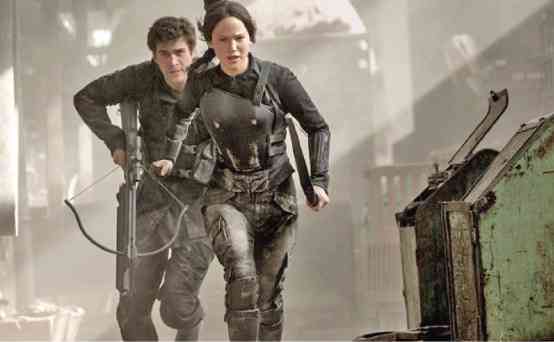After the harrowing events of last year’s “Hunger Games: Catching Fire,” the latest sequel “Mockingjay–Part 1” depicts the serious escalation of hostilities between the rebel forces of Panem and the fascist government led by President Snow (Donald Sutherland).
A full-fledged war movie, “Mockingjay” is the penultimate installment in the series of films about a despotic rule that forces Tributes—young representatives of various “districts”—to slug it out to the death.
An unexpected heroine, Katniss Everdeen (Jennifer Lawrence) becomes the symbol of hope to the masses, which are subjugated by Snow’s forces and distracted with annual “Hunger Games,” a violent bread-and-circuses contest that Katniss wins in the first film.
Snatched by rebel forces in the last cliffhanger, the teen archer adjusts to the role of the Mockingjay, a freedom-fighting symbol that rallies the oppressed, struggling in the remaining districts.
From the get-go, “Mockingjay” is slightly darker than the first two films. Instead of children and teens pitted against each other in a forest arena, there are open executions of rebellious prisoners by government forces—among other atrocities—that are similarly televised.
Lawrence is nothing short of fantastic in this one; Katniss is the epitome of strength, empathy and desperation, not necessarily in that order. Not that she wasn’t before; she’s just doubly so now. Her desire to rescue her fighting companion Peeta Mellark (Josh Hutcherson) from the clutches of the enemy is nigh-tangible.
Aptly textured
“Mockingjay” is made aptly textured by acting from the late Philip Seymour Hoffman, remarkably witty as Plutarch, whose publicity-honed mind contributes immensely to the rebels’ propaganda videos.
The film also stars Sam Claflin (as the considerably less-cocky Finnick this time), Elizabeth Banks (the considerably less-glamorous Effie), Julianne Moore (the astute rebel leader President Coin), Natalie Dormer (the shrewd Cressida) and Liam Hemsworth (Katniss’ dear friend and fellow rebel Gale).
Not surprisingly, the series has become an inspiration for real-life protests; “Mockingjay,” like “V for Vendetta,” strikes a chord with the disenfranchised and persecuted.
Depictions of political and personal struggles neatly intersperse, evoking all possible emotions—there’s even well-placed, well-timed humor, although briefly.
One can’t help but look forward to similarly heavy, intense conflicts in the climactic installment, to be released next year.
“Hunger” has inexorably turned to war, after all, and all bets are off.


